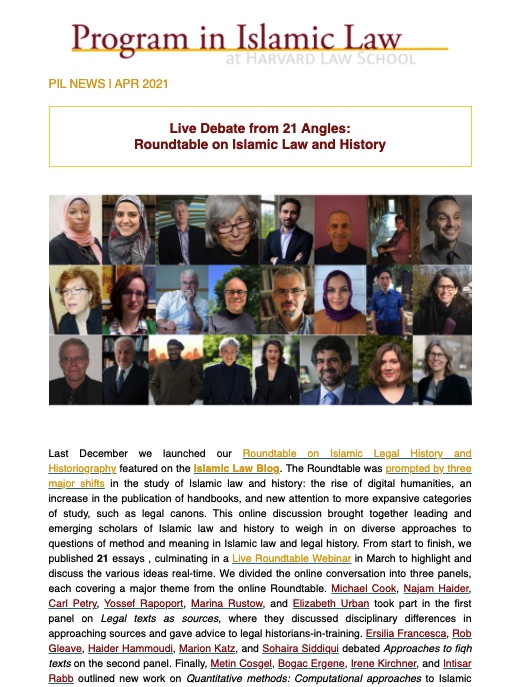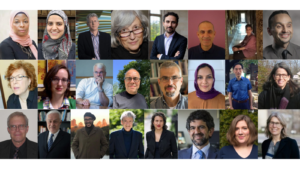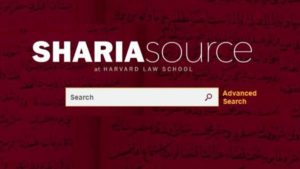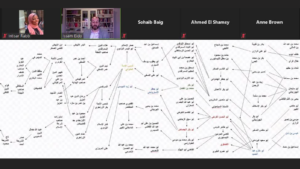
 Battle of the Historians: Last December we launched our Roundtable on Islamic Legal History and Historiography featured on the Islamic Law Blog. The Roundtable was prompted by three major shifts in the study of Islamic law and history: the rise of digital humanities, an increase in the publication of handbooks, and new attention to more expansive categories of study, such as legal canons. This online discussion brought together leading and emerging scholars of Islamic law and history to weigh in on diverse approaches to questions of method and meaning in Islamic law and legal history. From start to finish, we published 21 essays , culminating in a Live Roundtable Webinar in March to highlight and discuss the various ideas real-time. We divided the online conversation into three panels, each covering a major theme from the online Roundtable. Michael Cook, Najam Haider, Carl Petry, Yossef Rapoport, Marina Rustow, and Elizabeth Urban took part in the first panel on Legal texts as sources, where they discussed disciplinary differences in approaching sources and gave advice to legal historians-in-training. Ersilia Francesca, Rob Gleave, Haider Hammoudi, Marion Katz, and Sohaira Siddiqui debated Approaches to fiqh texts on the second panel. Finally, Metin Cosgel, Bogac Ergene, Irene Kirchner, and Intisar Rabb outlined new work on Quantitative methods: Computational approaches to Islamic Law and history, where they discussed what can be gained by blending quantitative and digital methods with traditional approaches. The full webinar is now available at the PIL website and Vimeo.
Battle of the Historians: Last December we launched our Roundtable on Islamic Legal History and Historiography featured on the Islamic Law Blog. The Roundtable was prompted by three major shifts in the study of Islamic law and history: the rise of digital humanities, an increase in the publication of handbooks, and new attention to more expansive categories of study, such as legal canons. This online discussion brought together leading and emerging scholars of Islamic law and history to weigh in on diverse approaches to questions of method and meaning in Islamic law and legal history. From start to finish, we published 21 essays , culminating in a Live Roundtable Webinar in March to highlight and discuss the various ideas real-time. We divided the online conversation into three panels, each covering a major theme from the online Roundtable. Michael Cook, Najam Haider, Carl Petry, Yossef Rapoport, Marina Rustow, and Elizabeth Urban took part in the first panel on Legal texts as sources, where they discussed disciplinary differences in approaching sources and gave advice to legal historians-in-training. Ersilia Francesca, Rob Gleave, Haider Hammoudi, Marion Katz, and Sohaira Siddiqui debated Approaches to fiqh texts on the second panel. Finally, Metin Cosgel, Bogac Ergene, Irene Kirchner, and Intisar Rabb outlined new work on Quantitative methods: Computational approaches to Islamic Law and history, where they discussed what can be gained by blending quantitative and digital methods with traditional approaches. The full webinar is now available at the PIL website and Vimeo.
 CONTENT: SHARIAsource Portal SHARIAsource is a portal for Islamic law that collects, collates, and organizes primary sources in tandem with scholars from other institutions. Organized geographically and historically, the Portal’s primary sources demonstrate the long and diverse history of Islamic law. We recently created a new ‘Books’ sub-category under the ‘Historical Primary Sources’ category in our Portal, which currently includes 58 out-of-copyright books. The SHARIAsource portal solely houses primary sources. For research, commentary, and analysis, see the related scholarly research published regularly on the Islamic Law Blog, the Journal of Islamic Law, and the Book Series in Islamic Law, all of which create ample space for conversation, debate, and new methods on the rich troves of primary sources in the field.
CONTENT: SHARIAsource Portal SHARIAsource is a portal for Islamic law that collects, collates, and organizes primary sources in tandem with scholars from other institutions. Organized geographically and historically, the Portal’s primary sources demonstrate the long and diverse history of Islamic law. We recently created a new ‘Books’ sub-category under the ‘Historical Primary Sources’ category in our Portal, which currently includes 58 out-of-copyright books. The SHARIAsource portal solely houses primary sources. For research, commentary, and analysis, see the related scholarly research published regularly on the Islamic Law Blog, the Journal of Islamic Law, and the Book Series in Islamic Law, all of which create ample space for conversation, debate, and new methods on the rich troves of primary sources in the field.
 CONTEXT: Islamic Law Speaker Series In our Islamic Law Speaker Series, Issam Eido of Vanderbilt University gave a lecture titled “Early Ḥanafī Approaches to Islamic Legal Interpretation, 3rd/9th – 4th/10th Century” which focused on ʿĪsā b. Abān – a 9th-century Ḥanafī legal scholar who studied with and influenced leading Ḥanafī scholars of his period. Eido’s talk explores how, amid the contested debates about the validity of ḥadīth as a reliable source of law, Ibn Abān constructed new criteria for measuring the authenticity of ḥadīth based on legal canons (qawāʿid fiqhiyya), and analogical reasoning (qiyās) as valid bases for legal interpretation and derivation. Ahmed El Shamsy of the University of Chicago served as discussant. See the full webinar on Vimeo.
CONTEXT: Islamic Law Speaker Series In our Islamic Law Speaker Series, Issam Eido of Vanderbilt University gave a lecture titled “Early Ḥanafī Approaches to Islamic Legal Interpretation, 3rd/9th – 4th/10th Century” which focused on ʿĪsā b. Abān – a 9th-century Ḥanafī legal scholar who studied with and influenced leading Ḥanafī scholars of his period. Eido’s talk explores how, amid the contested debates about the validity of ḥadīth as a reliable source of law, Ibn Abān constructed new criteria for measuring the authenticity of ḥadīth based on legal canons (qawāʿid fiqhiyya), and analogical reasoning (qiyās) as valid bases for legal interpretation and derivation. Ahmed El Shamsy of the University of Chicago served as discussant. See the full webinar on Vimeo.
See the full newsletter.

